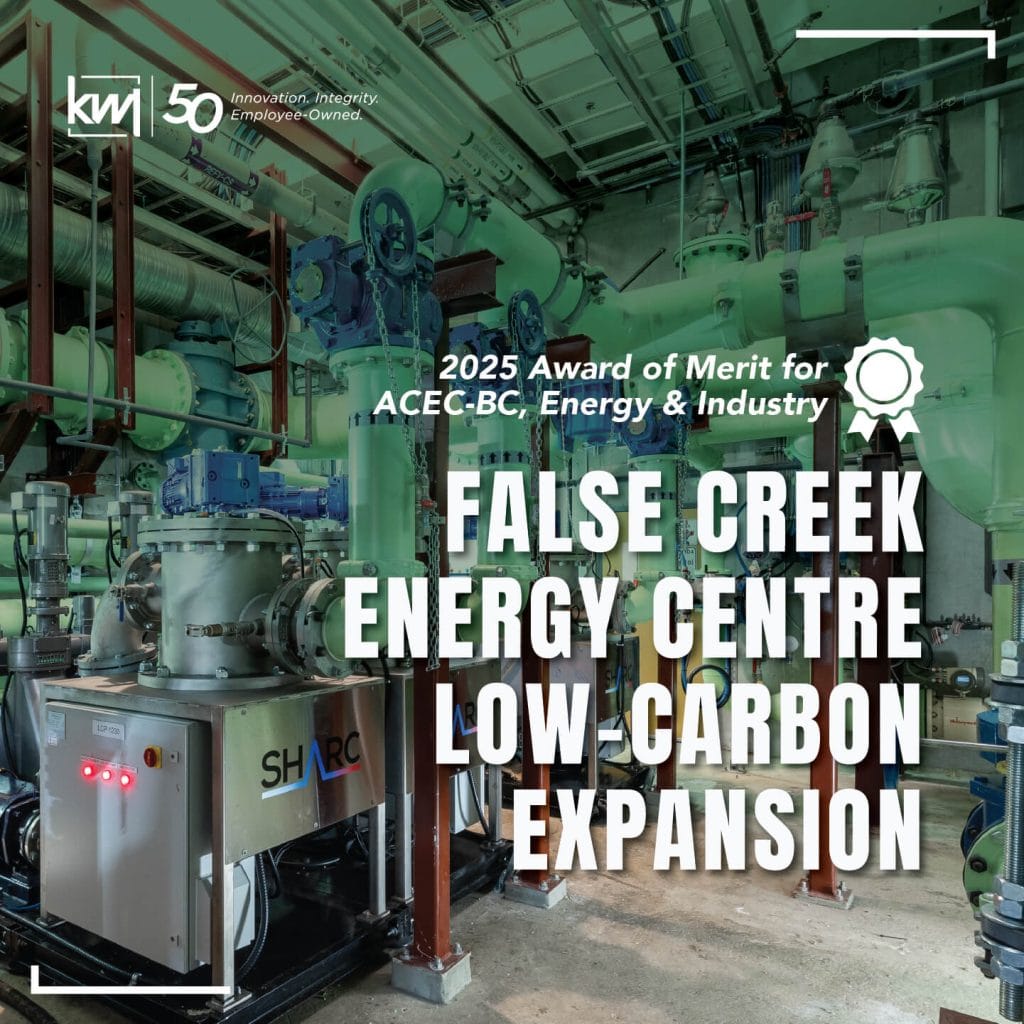Kerr Wood Leidal Wins ACEC-BC Award for False Creek Energy Centre Low Carbon Expansion
Kerr Wood Leidal Associates Ltd. (KWL) has been awarded the prestigious Award of Merit in the Energy & Industry category of the ACEC-BC Awards for Engineering Excellence for their groundbreaking work on expanding the False Creek Energy Centre—transforming it into the largest sewage heat recovery facility in North America. Through innovative system integration, spatial optimization, and custom technology development, KWL helped the City of Vancouver significantly increase low-carbon energy generation, positioning the city as a national leader in sustainable district energy.
The City of Vancouver Neighbourhood Energy Utility is committed to achieving 100% low-carbon energy by 2030, from 70% currently, to further reduce building-related greenhouse gas emissions. At the heart of this transformation is the False Creek Energy Centre (FCEC)—a cornerstone of Vancouver’s District Energy System (DES), supplying sustainable heat to 47 buildings totaling over 7 million square feet in the city’s vibrant core. Before this pivotal expansion, approximately 40% of FCEC’s energy supply was from heat pumps with an additional 30% coming from renewable natural gas.
To reduce gas consumption, the City launched a low-carbon expansion project to maximize the facility’s sewage heat recovery potential. The project successfully added 6.6 MW of sewage heat recovery heat pumps—tripling the facility’s heat pump capacity and transforming FCEC into the largest sewage heat recovery facility in North America. By optimizing the use of existing infrastructure and introducing innovative heat recovery technology, the project significantly increased low-carbon energy generation without requiring modifications to the connected buildings. The bold and innovative upgrades in this project are anticipated to increase the contribution from heat pumps to approximately 80% of the annual energy.
The benefits of this project are far-reaching. This approach will allow the City to exceed its current renewable energy commitments without the need for costly renewable natural gas purchases or new energy centers. The successful delivery of this project not only strengthens Vancouver’s position as a leader in sustainable energy but also serves as a model for other municipalities looking to implement similar carbon reduction strategies.
KWL developed progressive solutions to maximize low-carbon energy output within an existing facility. Our expertise in system integration, modeling & collaborative problem-solving enabled the City to significantly increase sewage heat recovery capacity while maintaining plant operations.
To fit additional heat pumps into the limited space, KWL used 3D scanning & advanced spatial modeling to optimize the layout, accommodating two new 3.3MW heat pumps instead of one while maintaining maintenance clearances. This more than tripled the total heat pump capacity from 3MW to 9.6MW, exceeding the City’s current low-carbon energy targets for the DES without additional infrastructure.
KWL redesigned the intake system for the new heat pumps to connect directly to a nearby forcemain, where higher temperatures improved heat pump efficiency & capacity. This was made possible by a new in-line filtration solution by SHARC, as traditional screening methods could not handle the higher pressure & flow. KWL worked with SHARC to design a custom high-pressure autostrainer system, pushing limits of existing technology. This ensured reliable filtration, eliminated hazardous wet well maintenance & set a new standard for future sewage heat recovery projects.
To maintain plant operations, KWL used detailed stress analysis & 3D modeling to optimize equipment placement, minimizing piping stress & rework. Careful sequencing & valve placement aided smooth integration without service disruptions.
The increased heat recovery capacity boosts the anticipated low-carbon energy supply from heat pumps from 40% to 80% without costly renewable gas purchases or new energy centers. This project contributes to Vancouver meeting its renewable energy goals & strengthens its role as a leader in sustainable energy. The new technology and strategies developed for FCEC will be implemented in other facilities across the region, serving as a model for municipalities aiming to reduce carbon emissions.


